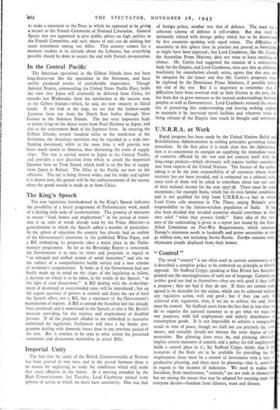• Control "
The word " control" is too often used in current controversy as if it described a complete policy to be embraced on principle or bitterly opposed. Sir Stafford Cripps, speaking at East Bristol last Saturday, pointed out the meaninglessness of such use of language. Controls are neither good nor bad in themselves—they are only good if they fulfil a purpose ; they are bad if they do not. If there are certain ends, agreed to be desirable for the nation, which can be achieved without any regulative action, well and good ; but if they can only be achieved with regulation, then, if we are to achieve the end, there must be control. Sir Stafford starts from the fact that in war-time we do so organise the national economy as to get what we want for war purposes, with full employment and orderly distribution of consumption goods. It is not impossible to achieve a comparable result in time of peace, though we shall not use precisely the same means, and certainly should not tolerate the same degree of regi- mentation. But planning there must be, and planning obviously implies certain measures of control, and a policy for full employment holds a central place in it ; Sir Stafford Cripps thinks that if the resources of the. State are to be available for providing for full employment there must be a control of investment with a view to productive planning, and there must be planning—that is, control— in regard to the location of industries. We need to realise that Socialism, State interference, "controls," are not ends in themselves, but are among the means that may be adopted for securing ends that r everyone desires—freedom from idleness, want and disease. a


























 Previous page
Previous page